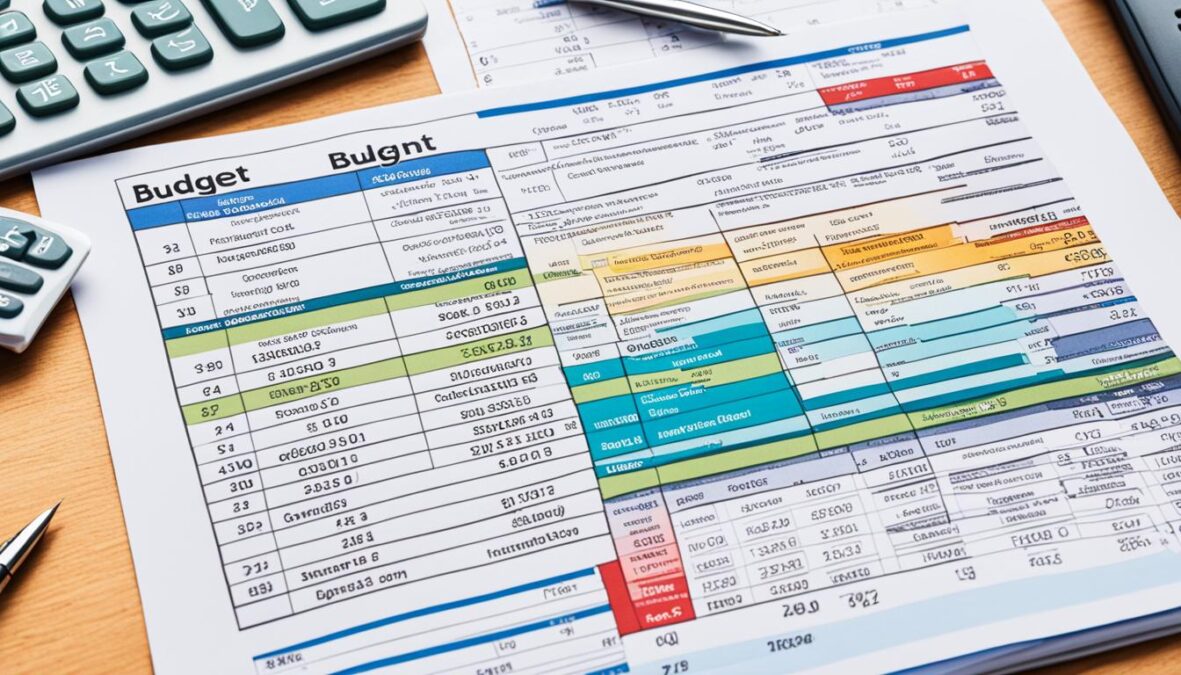Are your dreams of financial success feeling far off? This detailed guide is here to help. It will show you how to find financial security and meet your money goals. By using the right knowledge and tools, you can build wealth.
This article focuses on key financial topics. It includes budgeting, investing, and how to manage debt. You’ll also learn about planning for retirement and creating wealth. Whether you’re starting from scratch or looking to grow your assets, this guide is for you.123
Key Takeaways
- Automate your finances to boost savings and efficiency
- Prioritize short-term financial goals to maintain momentum
- Diversify your investment portfolio to manage risk
- Start saving and investing for retirement as early as possible
- Explore ways to increase your income through career growth and side hustles
Define Your Financial Goals
Figuring out your financial goals is key to managing your money wisely. This part of the journey will help you decide what you want to achieve both in the near and far futures. You’ll learn to set small, doable targets and the time it takes to hit them.
Establish Short-Term and Long-Term Objectives
Starting with financial planning, it’s crucial to set short-, intermediate-, and long-term goals. Short-term financial goals might be making a budget, lowering debt, or saving for emergencies.4 They guard against spending too much and help you get ready for the unexpected.4
Looking ahead, long-term financial goals could be about retirement savings, owning a house, or paying for a child’s college. Picking these long-term objectives shapes your complete wealth building plan.
Break Down Goals into Achievable Milestones
After setting your goals, breaking them into smaller pieces is crucial. This way, achieving what you want feels easier and less daunting.
For instance, aiming to save for a house down payment could mean setting short-term objectives like saving monthly money or paying off debts to boost your budget.
Create a Realistic Timeline
Mapping out a realistic timeline is essential for reaching your goals and staying motivated. Think about your finances, how much you make, and what you spend, as you plan when to hit your goals.
5Usually, people get another job 9 months after being laid off, which suggests saving enough for 9 months of living is smart.5Many focus on paying off existing debt without turning to new loans for true financial improvement.5Getting rid of a car loan often takes a few years, making it a goal for the near to mid-term.5
By setting clear milestones and timelines, you stay driven and make constant strides in reaching your wealth-building targets.
Track Your Spending and Income
Keeping a close eye on your tracking expenses and income tracking is key for managing your money well. It lets you know where your money’s coming from and going to. This helps you make smart choices to boost your financial awareness and money management.
84% of people struggle to keep track of their spending and stick to a budget.6 But, carefully watching your outgoings has big rewards. 56% of folks spot overspending within a month of tracking their expenses. Those who keep at it can save roughly $500 each year.6
67% prefer budgeting apps for tracking expenses.6 Such apps give all your finances in one spot, as 78% link their accounts. Yet, 42% like the old-school method of pen and paper. They find it helps cut back on spending.6
Try keeping a record of your spending for 3 months to see trends and where to cut back.6 This info can guide your budget, making your money work better for you. The 50/30/20 rule is helpful; 50% for needs, 30% wants, and 20% for saving or paying down debt.7
Keeping up with tracking your expenses and income tracking gives you a clear picture of your spending ways. This knowledge lets you plan smartly for both your immediate and future financial goals.67
Create a Comprehensive Budget
Creating a detailed budget is key to financial success. This guide helps you list all your earnings, sort out your spending, and set money aside for saving and investing. A solid budget lets you make smart money choices and move closer to your dreams.
List All Income Sources
First, write down all your income. This includes your main job’s salary, any side gig earnings, and money from investments. Also, note down any regular payments or savings account interest.8 When we talk about your earnings, remember, it’s what’s left after taxes and other deductions.9 Try to budget earnings from jobs and investments wisely.
Categorize Expenses
Now, divide your spendings into needs, wants, and money for the future. The 50/30/20 rule says to spend 50% on needs, 30% on wants, and 20% save.9 Typically, people plan their budget every month to control daily costs.9 Short-term expenses are in the operating budget, and long-term plans are in the capital budget.
It’s important to set clear spending limits for each type of expense.8 Being clear and realistic about your costs is vital.8 The advice to cut down on non-necessary spending first is a good tip.
Set Aside Money for Savings and Investments
Lastly, save and invest some of your money.10 Experts advise starting with a $500 emergency fund. Then, aim to save enough to cover a few months without worry.10 You should save 15% of what you make for retirement, including any employer match.8 Remember, little savings add up over time.10 Use automatic tools to make saving easier and stay on track better.
By making and sticking to a detailed budget, you’re setting yourself up to win with money. Keep track of your spending to see where you can do better.10 Staying on top of your budget means keeping an eye on your cash flow and adjusting as needed.
Invest in Yourself Through Education
Investing in your financial education is key for your future success.11 It helps you make smarter choices about money and improves your life.11 Financial education teaches you how to manage money, save, and invest wisely.11 Without this knowledge, people can struggle with debt and miss out on good job opportunities.11
Take Personal Finance Courses
Signing up for personal finance classes can change your life for the better.11 You’ll gain the confidence to make good money choices and avoid debt.11 You’ll learn how to plan for the future and better handle your finances.11 This knowledge can lead to a more secure financial future.
Learn About Investment Strategies
Understanding investment methods is also key to doing well with your money.11 You can learn by reading, taking classes, or listening to experts.11 Getting to know about stocks, bonds, and more will help you grow your wealth.11
By learning more about personal finance and investing, you set yourself up for success.11 This journey continues throughout life and can greatly strengthen your financial state.11
Automate Your Finances
Setting up automatic transfers and bill payments can boost your money management game.12 Automating key financial tasks lets you make steady progress with less effort. It means you don’t have to worry about moving money around or remembering due dates.13
Set Up Automatic Transfers for Savings
By automating savings, you could grow wealth more effectively.12 For instance, Michelle directs 5% of her income into her 401(k) and another 5% into her Roth IRA.12 She then splits these savings up for different life events, such as a wedding, a new home, or a vacation.12 This strategy lets her meet financial targets without constant checking.
Automate Bill Payments
Set automatic bill payments to save time and prevent late fees.13 Many providers allow you to set these up for things like utilities, loans, and credit cards.13 This way, you can cut down on the financial tasks you actively focus on.13
Organize your bill due dates and use alerts to keep score of your spending.13 This combo can prevent over-spending, possibly saving you from overdraft fees.13
Automating finances frees up significant time each week.12 It’s like setting your money to manage itself, allowing you to spend less effort and time.12 Keep an extra amount in your checking, and if you need to, see if you can avoid overdraft fees.12
Taking on financial automation revolutionizes how you handle money.12 It helps with saving, paying bills, and grants you time for what really matters in your life.13
Leverage Employer Benefits
Many employers give out helpful benefits. These can really help with your money for the future.14 In the U.S., inflation is really high, so more companies are helping their workers handle money stress. They give out benefits that teach good money habits.14
Contribute to Retirement Plans
It’s key to save in retirement plans like 401(k)s or pensions. It helps make sure you’re okay money-wise in the future.14 Your job may offer help from experts like BrightPlan for planning your retirement.14
Maximize Employer Matching Contributions
Try to get as much as you can from employer matching contributions. It means more money for you later.14 Your company might help you manage debt by checking your credit and making a plan with Credello.14
Grab all the employer benefits you can. They can help a lot with your money and set you up for a solid financial future.14
Start Investing Early
Starting to invest when you’re young can really change your future finances.15 Young investors benefit because of the way compound earnings work. This means your money grows by making more money over time.15 You can start with small amounts of money, thanks to the low initial investments, no fees, and the option to buy ‘part’ of a share.15 For instance, if you invest $200 each month for 10 years at 6% interest, you could end up with $33,300. Out of that, $24,200 would be what you put in, and the rest is the interest you’ve earned.15
Open an Individual Retirement Account (IRA)
One great start is opening an IRA.16 The 2023 contribution limits for under 50s are $6,500, and $7,500 for those 50 and older. By beginning to save in an IRA early, you allow your money to benefit from compounding. This can lead to a more secure future when you retire.
Diversify Your Investment Portfolio
16 Spreading your money across different investments is smart. It lowers your risk and keeps your money growing.16 It’s also important to stay calm during market downturns. Selling when things are bad can hurt your long-term gains.17 By starting to invest early, you begin a path towards financial safety and the chance to grow your wealth.17
17 At 18, Jane put $1,000 in an S&P 500 fund. After 30 years, it was worth $16,600.17 On the other hand, Bill waited until he was 28 to invest $1,000. In 20 years, his fund only grew to $6,000.17 Jane made $10,000 more than Bill because she started earlier.17 This shows how early investing in smart funds can pay off.17
17 Starting to invest early gives your money more time to grow. This growth could come from dividends, interest, or the profit when you sell (capital gains).17 It also lets you get used to the idea of risk and learn from ups and downs in the market. Starting early also helps you match your dreams with your financial goals, like saving for school, trips, or when you stop working.17
17 Early investing is particularly helpful for those with modest incomes. It makes you rely less on earning a lot later on.17 It teaches you to be careful with money, which leads to saving and investing more over time.17 Aiming to invest early puts you on the road to a more financially stable and prosperous life in the future.
Increase Your Income Streams
Adding more ways to make money is key to building wealth faster. You can focus on getting ahead in your job, lining up side gigs, or investing for passive income. Doing these together can really grow what you earn.
Pursue Career Advancement Opportunities
Looking for chances to grow your income at work is smart. This might mean going for promotions, learning new skills, or moving to a new role that fits your goals.18 Keep learning and working hard to get better jobs or more pay. This boosts how much you make and save over time.
Explore Side Hustles and Passive Income Sources
Aside from your main job, try adding more money sources. This could mean running an online store, freelancing, or turning your hobbies into cash.18 Also, look into ways to make money without working all the time, like through renting out property or investing. This extra income helps secure your future financially.
By mixing job growth with different ways to earn money, you can significantly increase your income. This can speed up your journey to making more wealth. It’s a path to more financial success and freedom.
Seek Professional Advice
Managing your own money is fulfilling, but there’s a time for expert financial advice. A skilled financial advisor offers broad guidance. They help with tricky money moves and reach your wealth goals.
Consult a Financial Advisor
When thinking about a financial advisor, know your options first.
Registered investment advisors (RIAs)
need to be listed with the U.S. SEC or their state, based on what they handle.They follow a strict rule to always put their clients first.
Utilize Financial Planning Tools and Calculators
On top of a financial advisor, use online tools for insights.
Financial planning tools
and calculators help know your money now. They also guide you for the future. You can plan retirement, manage debts, make budgets, and decide on investments.
Combining expert advice with digital tools gives you more power over your money. You’re better equipped to handle your financial advice and
personal finance
Personal finance changes all the time. People look for ways to deal with budgeting, investing, managing debt, and building wealth.20 The Federal Reserve Bank says household debt went up by $3.4 trillion since December 2019. This was just before the recession hit. Credit card debts, auto loans, and consumer loans all went up.20 This section aims to help folks reach their financial dreams and make their future financially secure. We’ll share tips and ideas to help you handle your money better.
To be good at personal finance, you need to set clear money goals.21 Make both short and long-term targets. This guides your way to building wealth. It also turns big goals into smaller steps.21 It’s not just about knowing where you want to go. It’s about the journey of getting there, which teaches you discipline and makes you accountable.
Watching your spending and what you earn is key.22 Keep a close eye on your income sources like salary and bonuses. Also, track your spending, which can be buying things with cash or credit.22 This helps find places where you can save money. It also helps you make wise choices about your cash.
Having a detailed budget is essential.20 List your income and sort out your expenses. Also, include money to save and invest.20 A good budget gives you more power over your money. It helps you reach your financial goals better.
It’s smart to invest in learning more about personal finance.21 Take classes or read up on how to invest. This knowledge lets you make better money choices. It also deepens your grasp of how to build wealth.21 Always being ready to learn more about finances is a great habit.
Automating savings and bill payments is a great move.20 Also, take full advantage of your job’s benefits, like contributing to your retirement plan. This can really help make your future financially stable.21
By using these personal finance tips and staying flexible in how you manage money, you set yourself up for ongoing financial success.202122
Maintain an Emergency Fund
Having an emergency fund is key for good money management. It acts as a cushion for unexpected costs. It keeps your finances strong when life throws surprises your way.23
Determine an Appropriate Emergency Fund Amount
The ideal emergency fund should cover three to six months of living expenses. The exact amount varies per person. Aim to start with $500 in your fund. Then slowly build it up to six months of expenses.24
Separate Emergency Savings from Regular Savings
It’s smart to keep your emergency money separate. Use a high-yield savings account or a CD to save better. They can have interest from 4.60% to 5.50%.24 This way, you can clearly see what’s for emergencies and what’s for other goals. It helps in planning your money well and staying ready for surprises.
Remember, saving for emergencies takes time. Every bit you save helps, even if it’s not much.23 Make a habit of saving, watch your spending, and grab chances to save more. These steps will grow your fund slowly but surely.23
If your emergency fund is well-stocked, you’ll worry less about sudden expenses. This means you might not need to use credit cards or loans as often.23 It also makes sure you stay on track with your financial health. And it’s a big help for when the unexpected happens.
Conclusion
This guide gave you many personal finance tips for winning with money, growing wealth, and ensuring your future financial safety. By setting goals, watching what you spend and earn, making a budget, learning more, setting up automatic payments, using work benefits, starting to invest early, finding more ways to earn, and getting expert help, you’re ready to manage your money smarter. This means you have the info and tools to shape your financial path.
The tips in this guide are like a map for those wanting to boost their financial health. They include managing money, handling debt, spreading out investments, and preparing for retirement. With such a broad range of advice, you’re set to reach your wealth goals.20
By using automated finance tools, picking the best work benefits, and learning from pros, you’ll simplify managing money and make better choices.25 Plus, learning about money and finding new ways to make it can really strengthen your financial plans and make sure you’re set for the future.26
Always remember, every small step counts towards a richer and more secure financial life ahead. Use the advice in this guide and begin your journey to reach your personal finance dreams.25
FAQ
What are the key personal finance strategies covered in this guide?
This guide talks about several personal finance strategies. These include setting financial goals and tracking spending. It also mentions creating a budget, learning more about finance, and automating your money.
It suggests taking advantage of employer benefits and starting to invest early. Also, it talks about ways to grow your income, when to seek professional advice, and the importance of having an emergency fund.
Why is it important to define clear financial goals?
Having clear financial goals is key to success. It’s the first step in your finance strategy. This process helps you set milestones and a timeline for achieving your goals.
How can closely monitoring spending and income help improve personal finances?
Watching your money helps you see where it comes from and goes. This insight helps in budgeting and planning your finances. It’s about taking control of your money.
What are the key steps in creating a comprehensive budget?
First, list all your incomes and the sources. Then, sort out your expenses into categories. After that, decide how much to save or invest. This approach helps in making smart financial choices and reaching your goals.
How can investing in personal finance education benefit one’s financial well-being?
Learning about finance and investing can really help. It gives you the knowledge to make good financial choices. This, in turn, helps you work towards building wealth.
What are the benefits of automating financial tasks?
Automating your finances makes it easier to save and pay bills. It saves you time and helps stay on top of your money goals more easily.
Why is it important to leverage employer benefits?
Employer benefits like retirement plans can boost your finances. They help in growing your wealth faster.
What are the advantages of starting to invest early?
Investing early can greatly impact your financial future. It helps you grow your money over time while managing riskbetter.
How can increasing income streams benefit one’s personal finance strategy?
Getting more money from work, extra jobs, or passive sources helps a lot. It speeds up how fast you can save and grow your wealth.
What are the benefits of seeking professional financial advice?
Talking to a financial advisor can offer great insight. They use tools to help you understand and plan your finances better. This can help you achieve your financial goals more effectively.
Why is it important to maintain an emergency fund?
An emergency fund is like a safety net for your finances. It keeps you from going off track when unexpected costs pop up. This way, you can stick to your long-term financial plans.
Source Links
- https://smartasset.com/financial-advisor/financial-strategy
- https://dfpi.ca.gov/wp-content/uploads/sites/337/2019/06/8_Tips_for_Financial_Success.pdf
- https://www.forbes.com/sites/forbesfinancecouncil/2022/12/29/personal-financial-strategies-that-anyone-could-use/
- https://www.investopedia.com/articles/personal-finance/100516/setting-financial-goals/
- https://www.credit.org/blogs/blog-posts/financial-goals-examples-and-tips
- https://www.forbes.com/sites/melissahouston/2024/01/12/how-to-track-your-spending-and-slay-your-finances/
- https://www.nerdwallet.com/article/finance/tracking-monthly-expenses
- https://bettermoneyhabits.bankofamerica.com/en/saving-budgeting/creating-a-budget
- https://courses.lumenlearning.com/suny-personalfinance/chapter/creating-the-comprehensive-budget/
- https://www.nerdwallet.com/article/finance/how-to-budget
- https://www.mapfre.com/en/insights/economy/investing-in-yourself-financial-education/
- https://www.iwillteachyoutoberich.com/automate-your-finances/
- https://www.theverge.com/23608794/personal-finance-automation-how-to
- https://technologyadvice.com/blog/human-resources/employee-financial-wellness/
- https://www.nerdwallet.com/article/investing/how-to-start-investing
- https://www.investopedia.com/articles/younginvestors/09/college_finance.asp
- https://www.ngpf.org/blog/investing/the-power-of-starting-early-why-young-people-should-invest-when-theyre-ready/
- https://www.bankrate.com/investing/passive-income-ideas/
- https://www.nerdwallet.com/article/investing/how-to-choose-a-financial-advisor
- https://www.investopedia.com/terms/p/personalfinance.asp
- https://humanecology.wisc.edu/academics/undergraduate-majors/personal-finance/
- https://corporatefinanceinstitute.com/resources/wealth-management/personal-finance/
- https://www.consumerfinance.gov/an-essential-guide-to-building-an-emergency-fund/
- https://www.nerdwallet.com/article/banking/emergency-fund-why-it-matters
- https://www.linkedin.com/pulse/mastering-personal-finance-strategies-financial-success-singh
- https://milli.bank/blog/why-is-personal-finance-important/



